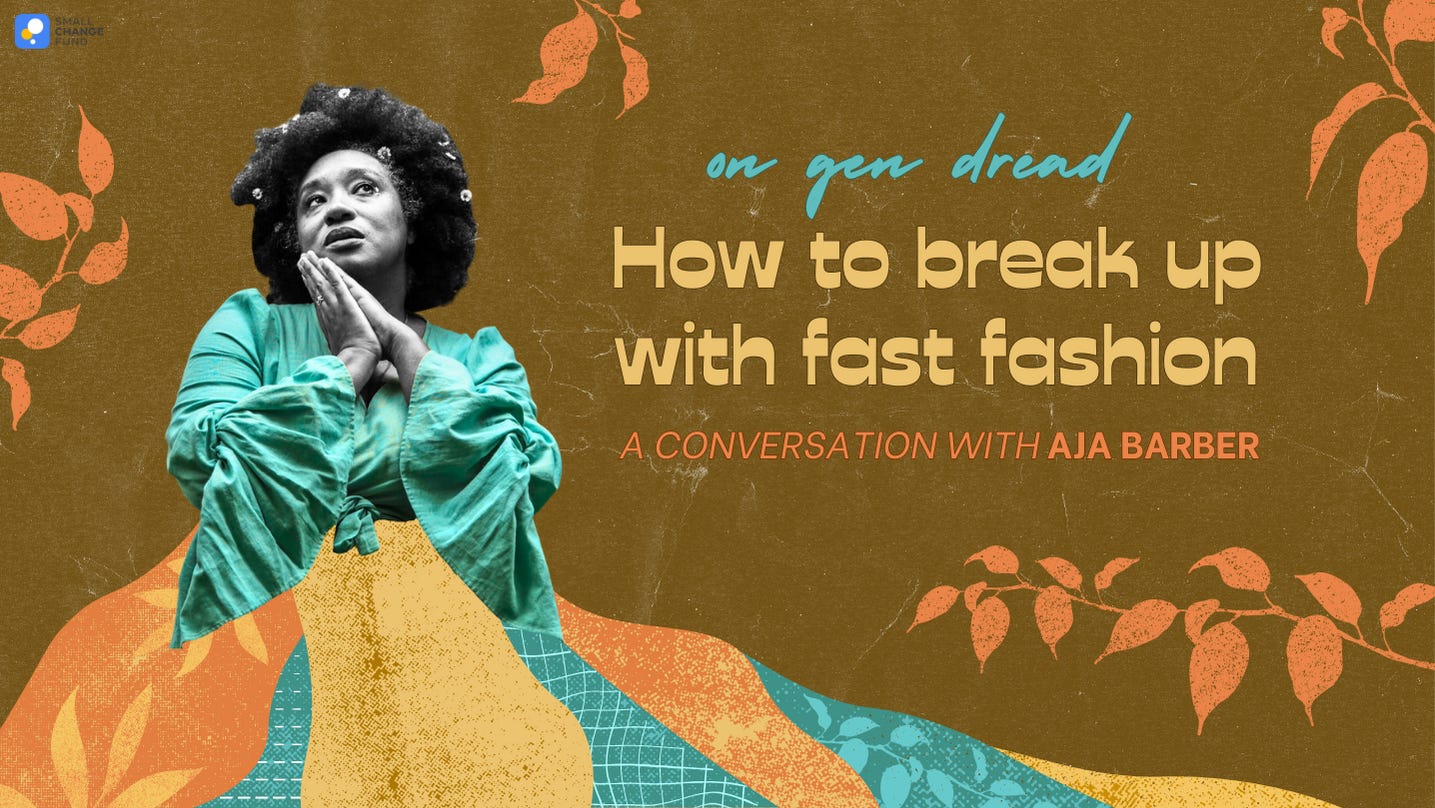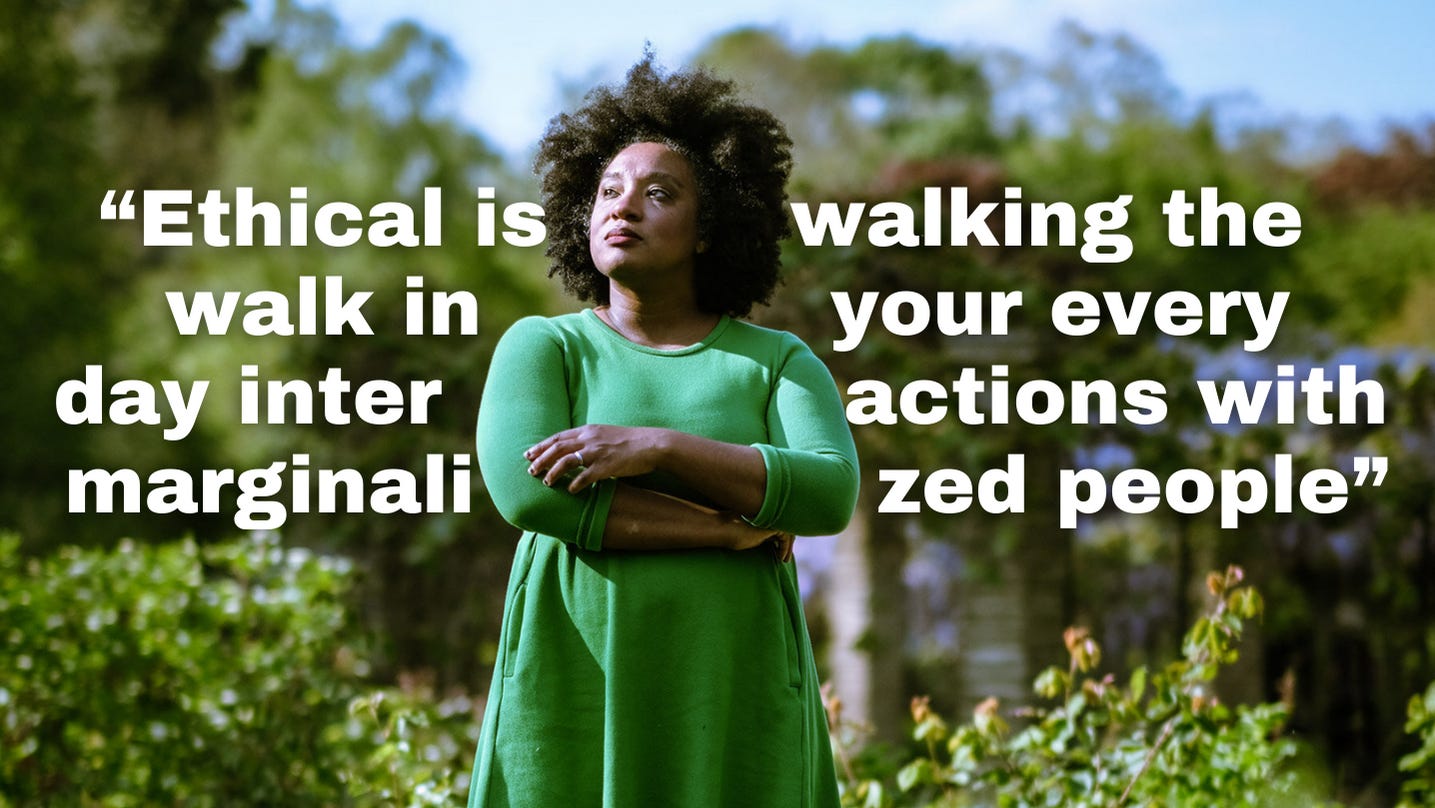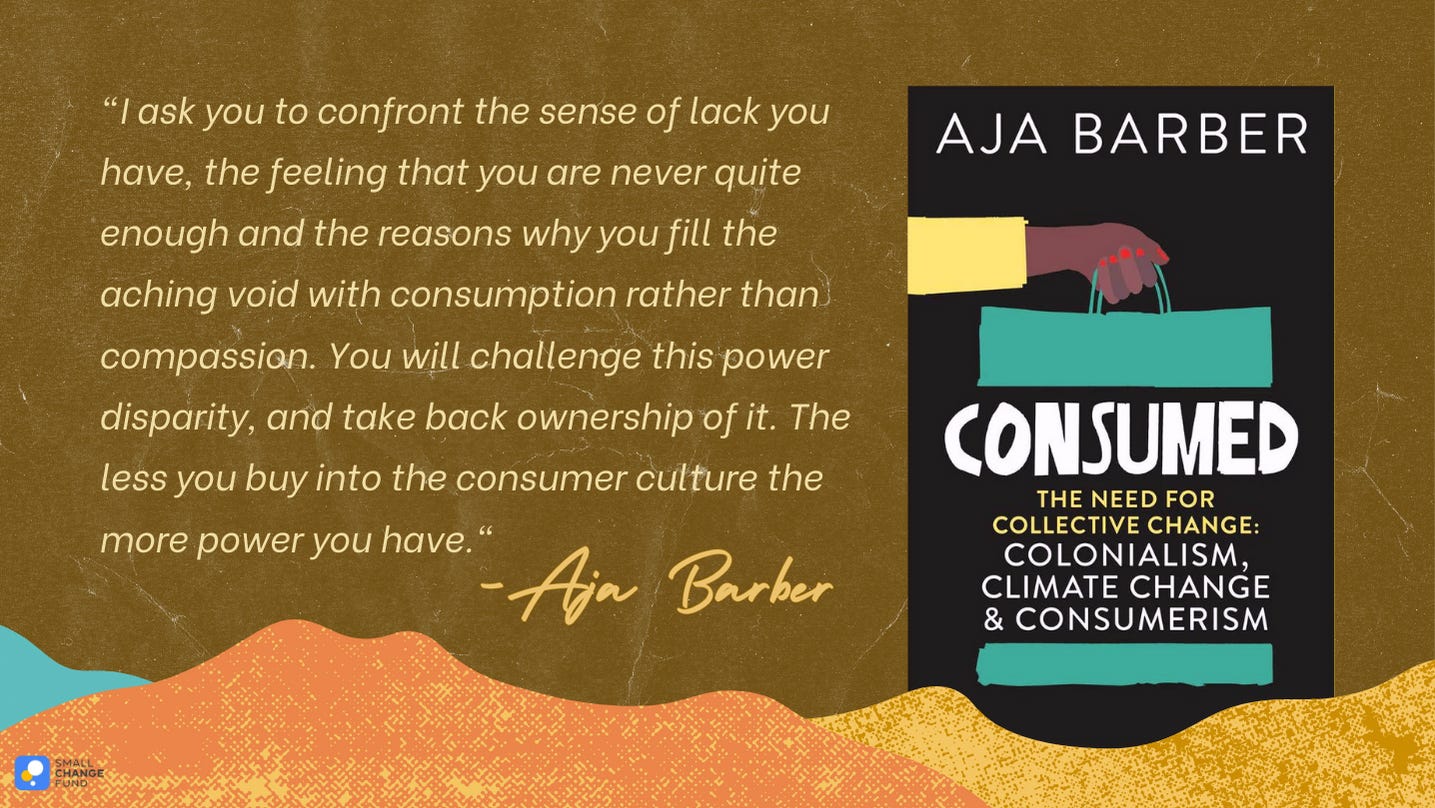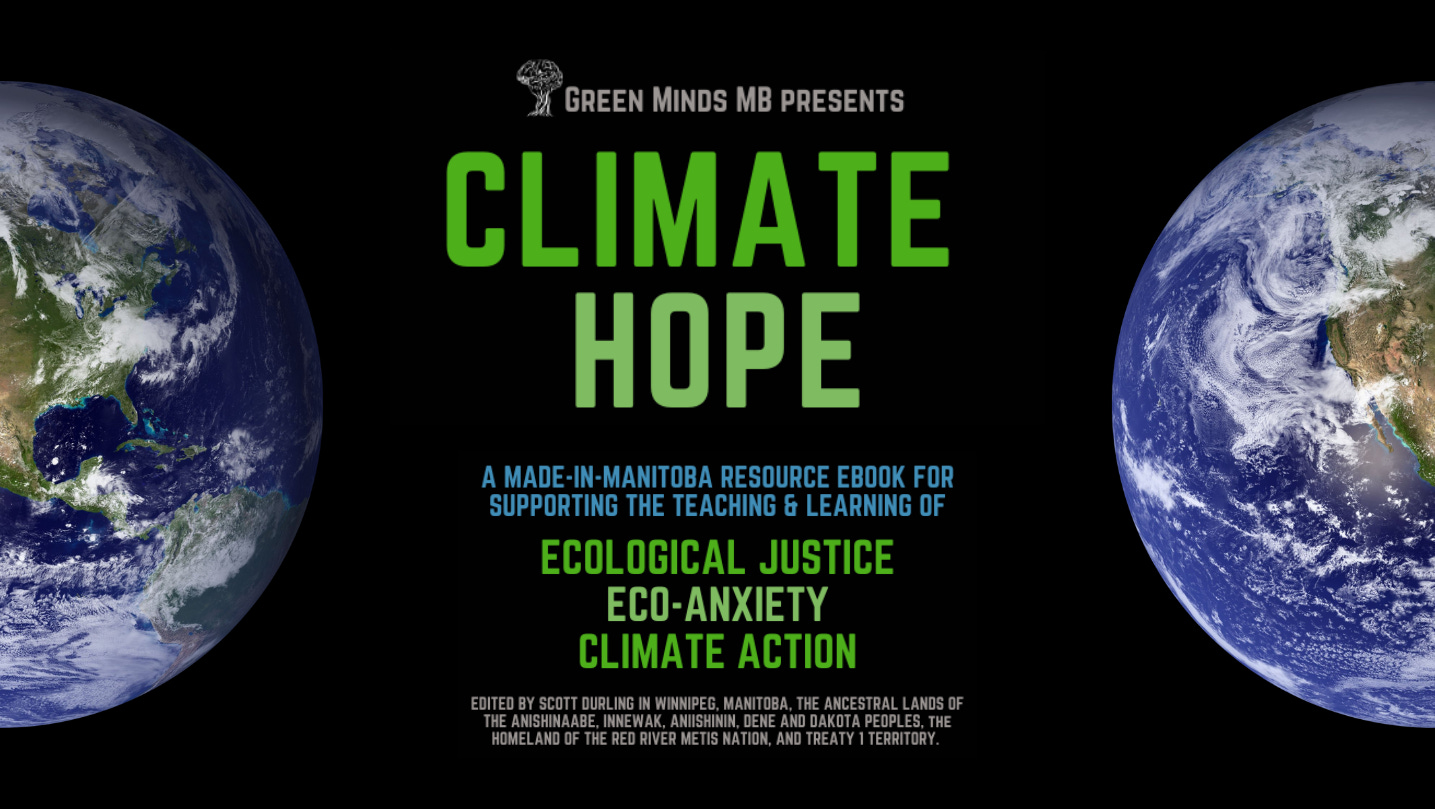How to break up with fast fashion
In Part 2 of our conversation with Aja Barber, we discuss how to move toward a wardrobe of climate-conscious clothing
Hi there!
Welcome to Gen Dread, a newsletter about how the climate crisis is making us feel, why that’s happening, and what we can do about it. Subscribe now to find community, comfort, and practical coping and acting strategies from experts all around the world.
The first step is a big mental shift.
Last week, we brought you the first part of our conversation with Aja Barber, an activist and author who speaks out about the environmental, racist, and colonialist horrors of the fast fashion industry. And now here is Part 2, in which Aja offers some great tips if you’re ready to start or continue shopping in a way that best aligns closet with climate.
GD: It seems that disentangling yourself from this system starts by dealing with that emotional void that tells you that you're not good enough and you need to buy clothes to paper over those feelings of discomfort.
AB: Totally. Marketers for the big box stores know this! It was grim in the UK during lockdown, because brands would literally wait until COVID relief checks dropped to send out emails about sales. They know when you shop, how often you shop, they know to send an email on Friday when it's payday. So many of these systems are pernicious, and now you have the banking systems as well, the buy-now-pay-later, which is really pernicious. It’s a whole other beast of trafficking people, wage and debt slavery. But it's marketed as a cutesy little thing.
I know a few ethical brands that are starting to employ payment plans, because obviously people do suffer sticker shock when the price of clothing you see in big stores is artificially depressed because of exploitation. But the whole predatory banking stuff? That's gross. It’s this idea that if you can't have something right now, today, when you want it, then somehow that equals oppression. It doesn't. That's us being ridiculous and entitled.
Psst: ethical shopping also improves your personal style. Here’s why.
GD: So what does it look like in practice to consume fashion as a climate-conscious person?
AB: You buy a whole lot less of it, that's for sure. Basically, if I can't get it ethically and I can't get it secondhand, then I don’t need it. I'm really lucky because I've got a wardrobe full of great clothing…but a lot of us do, if we actually think about it. There are very few people in some sort of emergency where they need a piece of clothing. The conversation around fashion has always been like, want! need! must have! But is it a need? Is it the same as food and clean water? I would argue that it's probably not. Like, yes, we all want to fit in through material items because that's our society, but that's just not really a need.
I also think when you slow down, you start to really develop your personal style, which leads to a much more fulfilling wardrobe that feels more like you. Whereas before, when you're trapped in the cycle of fast fashion, you’re buying trends that are being shoved at you and picked out for you before you even know. You might tell yourself that you picked that outfit all by yourself, but I assure you, a lot of those trends you see have been picked out by an expert who decided that this is the direction they're going to push you in.
It’s all decided months in advance. I would argue that it's made our personal style worse. But when you hop off this trend cycle and start to not just invest in your clothing, but care about who makes it and where it comes from, you develop a deeper connection with your clothing and you start to develop your own unique style. Once you have that, you're not as easily hooked, lined, and sinkered. And that sense of urgency we all have when we're spending money goes away. Slow fashion is slow. You stop feeling like you gotta get it NOW or you're never going to get it. Fast fashion definitely plays into this panic – this idea that they make a limited number of things and then if it runs out, maybe they'll restock it but maybe they won't, so if you don't get it, well, that's it: your life is over and you're a loser because you didn’t buy the dress. When really, you didn't need the dress.
People on Twitter will be like, “dude, tell me where I can find ethical fashion that's the same price as Shein.” Listen! It doesn't exist! The disconnect for me is this idea, which also ties into colonialism, that you want clothing where you think that everyone is paid fairly, but you actually want garments that cost pennies when you know that hourly, you don't make pennies. So like, what is this idea of fairness? And this is where the internalized colonialism comes in and people start saying things like, “well, that's a good job in that country.” I love when people say that because I just keep pushing them on it. Like, really? Do you want to work in that factory? And they're like, well, no. And I'm like, well, why not? You said it was a good job for them. And the more you point it out, the more uncomfortable everyone gets. We've normalized this notion that someone who lives in “that place over there” should be okay with making pennies for their labour, or with making less money than we do. No. That’s exploitation.
Here are the questions we should always ask clothing brands.
GD: What questions should we be asking when we’re looking at a brand?
AB: I do this every single day! Whenever I come across a new brand I like, I just send a little email. I'm like, hey, where's your product made? Is it made in a factory that's a living wage employer? What do you do with your waste? What do you do with your returns? Is everyone within your supply chain paid a living wage? I'd love to know more about the sustainability measures within your business and what you’re doing to reduce waste. Very simple questions. And I can guarantee you businesses that are doing good stuff are actually really excited to tell you about it.
That can be a really great conversation to have. Not just because brands realize that we care about this, which means they're going to give us more of it, but because it normalizes these conversations and it also slows you down as well. And when you buy a sweater from a small business that’s actually employing people and paying them fairly, more of that money is going to stay in your actual community, whereas if you buy from a big box store, only a percentage of that money stays in your community.
So do it, and do it kindly! Don't be rude about it – people forget that with small business, very often you are talking to a person, not a robot.
GD: Is there something preferable that these companies should be doing with waste rather than shipping it across the world?
AB: It’s challenging. At the moment, we don't have a lot of good systems for that. But I think what you need to remember is scale. With a small business, the scale of the returns they receive is not going to be anywhere near the same as a Shein or a Zara or an H&M. Some businesses literally recycle everything, or compost all their textile scraps and use natural fibers in everything so you can actually home-compost that stuff. But even a brand that's, for instance, upcycling – that in itself is a really good move. So it’s gonna look different for every brand, but just having a plan in place is better than nothing at all.
If you want to go deeper into this topic and get more practical guidance on breaking up with fast fashion, check out Aja’s recent book, “Consumed: The Need for Collective Change: Colonialism, Climate Change, and Consumerism”. Please consider supporting your local independent bookstore when you shop for books.
If you liked reading this, feel free to click the ❤️ button on this post so more people can discover it on Substack 🙏🏼
Making Waves
Green Minds Manitoba, a collective of Winnipeg-based professionals in mental health, psychological research, and education, is proud to announce the release of their resource ebook, Climate Hope. This comprehensive resource guide is designed to assist educators in navigating the challenges of teaching ecological justice, eco-anxiety, and climate action. The ebook addresses common concerns such as where to start, topics to integrate climate change into curriculum, and how to support students who may feel overwhelmed or hopeless. By providing educators with tangible and small places to begin, Climate Hope aims to empower and support action for both educators and students. Climate Hope is available as a public, free-for-use resource.
As always, you can share your thoughts and reach the Gen Dread community by commenting on this article or replying to this email. You can also follow along on Twitter and Instagram.
‘Till next time!









Very inspiring interview, thank you. I wrote my first mail!
Great post; thank you! I was never in much of a relationship with fast fashion, happy to say, and as I've aged, it has become easier & easier to unhook. I'm wearing pieces of clothing I've had for 20 years. The fashion industry and its related components operate on a foundation of greed (theirs, ours, etc.) As does all of capitalism. It feels so good to step back from that.